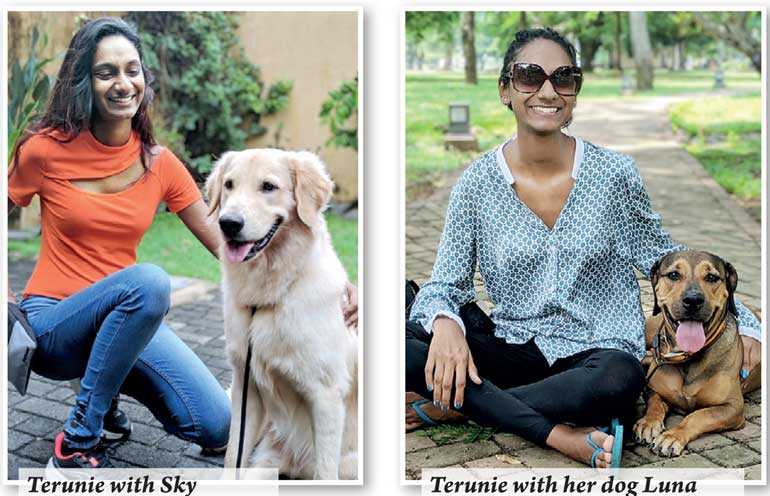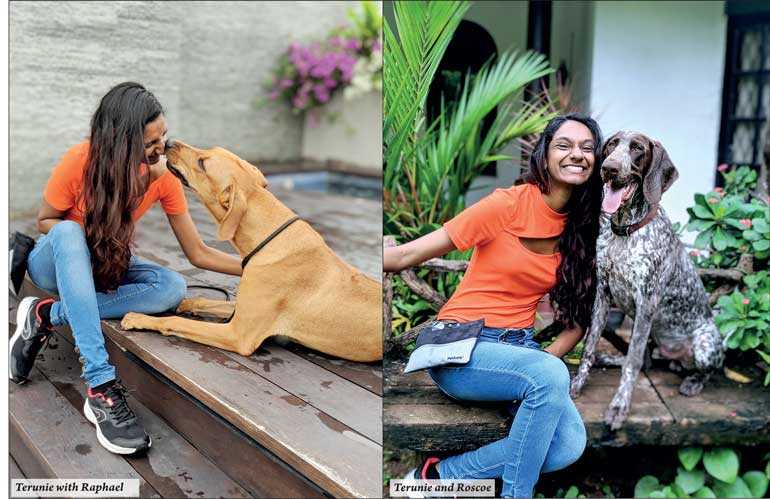Saturday Feb 28, 2026
Saturday Feb 28, 2026
Saturday, 23 November 2019 00:00 - - {{hitsCtrl.values.hits}}




By Madushka Balasuriya
Owning a dog is a responsibility, but just how much of a responsibility is frequently underestimated. Be it potty training, socialisation, frequent vet visits or simply the clean-up, looking after a dog is no walk in the park – though that too is part of the job description!
But for many dog owners or prospective dog owners, all that is part and parcel of the ultimately rewarding nature of owning a dog. The unconditional love and affection, the clear visible cues of adoration, the almost pathological need for companionship – you would be hard-pressed to find a human being on the planet whose life wouldn’t be enriched by the addition of a well-trained dog – well-trained, of course, being the operative set of words.
See, many people when they envision being a dog parent, there is the utopian dream of the quintessential television advert, where the pug follows the young boy around – a shadow, never leaving his side – the dog is besotted, never strays too far, as the two are seemingly linked on a molecular level.
Indeed, in popular culture a majority of dog portrayals, be it CGI, animated or real life, canines are routinely shown as these creatures that are hardwired for human companionship. What they don’t show is the behind-the-scenes work that it takes to getting a dog to behave in the way that you want it to.
This is where businesses like Pet’iquette come in. Founded by Terunie Senanayake, Pet’iquette specialises in ensuring your dog behaves the way it’s supposed to, while at the same time providing owners with the right tools for keeping a healthy, happy doggo.
In a nutshell, Terunie is a dog behavioural therapist, who began her journey into the profession when she realised that her adopted street pup was showing aggression at a young age. Having sought help from “quite a few trainers,” but ultimately unhappy with their methods, Terunie took matters into her own hands and decided to look into the world of canine psychology and behaviour.
“Thankfully, I didn’t have to do it all alone, I had a phenomenal amount of help from a friend and fellow canine behaviourist who encouraged and mentored me along the way,” she explains.
“I started with a UK course on the basics – canine care, breed specifications and training. I followed it up with a US course on understanding dog psychology and fixing complex behavioural problems. My training period also included a lot of hands-on work with a variety of breeds, ages and behavioural problems. I did and still do a lot of research and study to make sure my knowledge is up-to-date and that I have a holistic approach to training.”
In a sit-down conversation with Daily FT, Terunie spoke about some of the early warning signs regarding potentially problematic behaviour dog owners tend to miss, while also highlighting some of the most common missteps even experienced dog owners make.
PROBLEM BEHAVIOURS
Jumping
“It’s cute when they’re puppies but when it’s a 30-40kg dog jumping on your poor old grandmother, it’s not so cute [laughs].”
Biting
“Again when they’re small people tend to think that it’s okay because they’re teething and so they just let them chew on their hands, and then when it hurts they take their hand away. Except the puppy doesn’t understand that they can bite sometimes and not bite at other times. So teeth on skin is a no-no, never. If they are biting you immediately give them something else to bite like a toy, or say ‘no’ and take your hand away, or just walk away and withdraw your attention.”
Barking
“Constant barking can be one of the most annoying things in the world to neighbours especially if they bark at the slightest sound and keep you up all night. Initially it’s kind of cute because you think ‘oh it’s such a tiny bark,’ but if they’re barking it should be to alert you that somebody has come, and when you have been alerted they need to stop.
“People encourage barking by giving their pup attention when they bark. It then extends itself to whining and ‘crying’. If your dog is whining because you locked it out, it’s not crying, it’s trying to get away with something. The only reason for a dog to whine should be to alert you or their pack that they’re in pain. Not to get out of something, and not because they want something.”
Resource guarding
“Resource guarding is something you’ll see for example when dogs guard food from other dogs. They growl and snarl and maybe snap. Dogs are allowed to guard their food from other dogs by growling as long as they don’t harm the other dog.
“Did you know that dogs can also resource guard people? People think that ‘ah my dog is so attached to me, she won’t let anyone come near me,’ ‘you know, the other day someone tried to touch me and she snapped at them’. That is a serious behavioural issue because it can escalate to aggression. People think that it’s because the dog loves them, and wants to protect them, but in actuality it’s just that they’re guarding them like they would guard a bone; there’s no emotional connection there, it’s just ‘this is my source of food and comfort, don’t come near it because I don’t want to share it’.”
COMMON MISSTEPS
Lack of socialisation
“When they get their puppy home they keep it at home, and they protect it, and they spoil it. And that’s why you get dogs that are anxious, dogs who are territorially aggressive, dogs who are frustrated, hyper, etc. They need to know and see more than the vet, the garden and their house. Positive experience creates a confident, well-balanced dog. They need to be curious, to learn that the world is full of lovely people and experiences. Take them out but make sure you give them positive experiences. So you have to be very careful about who and what you expose your dog to. It depends on the age also of course. It has to be at the right age.”
Failure to understand background when adopting
“The first thing they have to look at is the parents, spend time with the parents, see if they have any hereditary illnesses, find out what kind of life the puppies have been brought up in. Unfortunately here a lot of the dogs are badly bred, the mothers are locked in cages, and they’re just taken away at four to six weeks (far too early) from their mom and sold. “The temperament of the parents are very important, it’s not just looks. Here what they do is breed for looks – breed for money mainly, and then looks – so you need to spend time with the parents. Watch them in different situations, how are they with food? How are they with their puppies? How are they with people? How are they with children? All of those things. And then choosing the right breed for your lifestyle is very important.
“If you’re a very active person then a dog like a Labrador or a Boxer, those breeds are alright. If you’re not very active a dog like a Pug is good. Any of the toy breeds. That being said every single dog needs some sort of exercise. If you’re getting a rescue – a pooch off the street, they need more exercise than a lot of the other breeds, because they’re super high energy dogs.”
Not starting training early enough
“Start training your dog as soon as you get him/her. Don’t wait until problems develop to call a trainer. Preventing bad behaviour is always easier and faster than fixing it.
“Any dog needs not only physical exercise but mental stimulation too. That’s very important. Cos they’re smart, Labradors, Golden Retrievers, Rottweilers, they’re all extremely intelligent working dogs. They need stimulation, they need to be taught, they enjoy learning.”
Lack of consistency
“Be consistent! I can’t stress the importance of consistency enough.”
In the end, for Terunie the three most important things about raising a well-balanced, happy dog, are that they need to be healthy, they need to have social relationships and they need exercise.
PET’IQUETTE AND
THE FUTURE OF DOG CARE IN SRI LANKA
While the response from the dog owner community to Pet’iquette has been resoundingly positive, Terunie knows that there’s still more to be done in terms of creating awareness among the general public about proper dog care.
Terunie hopes that ventures such as hers will go some way in educating dog owners and the public at large about dogs, and how to associate with them in a safe and caring manner. She also wants to share with the world the truly enriching relationships that can be created between humans and dogs when nurtured correctly.
“Training is so much more than obedience, it is about building a beautiful relationship and trust with your dog. I understand the mental, physical and emotional strain that comes with having a dog whose behaviour disrupts your daily life. It is quite stressful – I’ve experienced it! And I have also felt the exquisite joy when the training works. The relationship I have with my own dogs is what I want all owners to experience.
“I think one of the main problems we have here is a lack of knowledge and stigma associated with dogs so I would like to set up a system where everyone here has access to the knowledge needed to properly care for dogs. That way, the view people have of dogs will change. Having well-brought-up, well-balanced dogs means more cafés, parks and the like will open up to them. This will result in more wholesome lives for dogs all over the country.”
| You can find Pet’iquette on Instagram (@petiquette_sl), while you can contact Terunie directly on [email protected]. |